Factors affecting the Electric Car Range
1. Weather
Outrageous temperatures can altogether affect EV range for two reasons. Initially, an EV battery’s capacity to hold its charge is adversely affected by exceptionally low temperatures. Both effectiveness and the capacity to rapidly charge can be affected by frosty temps. Additionally, working your EV in blistering or cold environments likewise implies you will be working your lodge environment controls. Keeping your vehicle warm or cool influences range, as it draws on the battery power.
2. Charge Capacity
It sounds self-evident, yet EV range is likewise affected by how full you charge your battery. Automakers execute complex battery frameworks that limit the greatest charge to delay in general battery duration. Your EV won’t consistently be charged to 100 percent capacity. This turns out to be particularly vital to consider on a more drawn-out trip since numerous rapid-charge stations can rapidly bring an EV up to 80% in just 30 minutes.

3. Battery Age
As a battery age, it loses some greatest charge potential. However, this should not deter expected drivers, as the pace of degradation is just around 2.3% each year, and with appropriate upkeep, it tends to be even lower. And with a federally mandated eight-year, 100,000-mile battery guarantee, you can dependably anticipate that an EV should perform well for a long time.
4. Speed
In contrast to gas-powered motor (ICE) vehicles, EVs passage much better in city driving. Their capacity to regeneratively slow down keeps a charge while working in unpredictable rush hour gridlock. However, according to Vehicle and Driver, no EV has yet lived up to its estimated range at interstate speeds. The Audi e-Tron performed best at 75 miles each hour, achieving 93% of its Ecological Assurance Agency estimated range. If you are reliably logging thruway miles, it is essential to factor in your Ev’s capacity to keep up with range at speed.
How to maximize electric car range?
1. Regenerative Braking
Exploit your EV’s regenerative braking system. Whenever you lift your foot off the gas pedal in an EV, the electric engines work as generators while easing back the vehicle. On the off chance that you set your EV to its greatest regen setting, you will encounter positive genuine range impacts.
2. Routine Maintenance
Ensuring your EV is working appropriately will help your range. Maintenance for an EV is somewhat different from maintenance for traditional ICE vehicles. Every 12000kms, you should be regularly looking at parts for wear, turning tires, and looking at fluids. Like with any vehicle, ensuring tires are appropriately inflated and drivetrain parts are working flawlessly will help productivity. Additionally, as your battery ages, renovating dead cells to keep up with the most extreme capacity will assist with keeping your range nearer to its unique number.

3. Vehicle Preconditioning
Assuming you are driving in very cold or warm temperatures, it is an astounding idea to precondition your vehicle while it is as yet charging. While it is as yet plugged in, turn on either the A/C or the hotness and permit the vehicle to get to a familiar temperature. Numerous EVs even have a system to enter the desired temperature and expected departure time to precondition the lodge appropriately. This permits your vehicle to productively keep up with the lodge condition instead of modifying it while utilizing battery power alone.
4. Matching Your Vehicle to Your Needs
Before buying an EV, consider the different elements that influence range. Do you drive in a cold environment? Do you regularly log thruway miles? Will you have dependable admittance to charging at work? For instance, assuming you realize you will work your EV in cold temperatures without admittance to charging over the day, it is smart to get an EV with a range that exceeds your genuine daily mileage.


